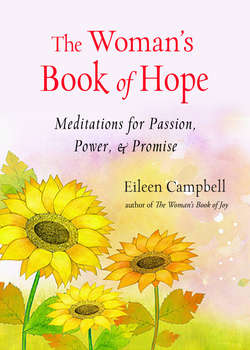Читать книгу The Woman's Book of Hope - Eileen Campbell - Страница 5
На сайте Литреса книга снята с продажи.
Introduction
ОглавлениеWe live in dangerous and uncertain times, lurching from one crisis to the next and reeling from one tragedy after another. We crave certainty, but life is in essence unpredictable. Hope appears to be in short supply, and fear can so easily overwhelm us as we try to stay afloat in our sea of troubles. In our personal lives, as in our dysfunctional world, we cannot protect ourselves from being touched by suffering. There is no cure for being part of the human race, and this can sometimes leave us feeling hopeless and powerless. We can all too easily find ourselves in a dark place of despair, reacting with anger or blame, or attempting to insulate or even anesthetize ourselves against the pain.
In Greek mythology when Pandora lifted the lid of the box she had been forbidden to open, all kinds of evil spirits were let loose into the world to wreak havoc. At the same time, however, a healing spirit named Hope was released to help humanity deal with suffering.
However dark the situation, hope is always available to us—“hope springs eternal in the human breast,” wrote the poet Alexander Pope. Hope is born in darkness, just as we see the stars only when the sky is black.
Crisis isn't totally bad, however; it can result in breakthrough as well as breakdown. Hope doesn't deny the darkness, nor does it expect everything to be as it once was before the crisis, but it does offer the possibility of redemption. Quite simply, hope is a miracle for it changes us, changes the situation we find ourselves in, and is contagious, spreading beyond us to others.
Hope is both a choice and an action. If we give way to despair, we are unable to do anything. And although human history is a catalog of woes, it is worth reminding ourselves that it is also rich with magnanimous acts of courage, sacrifice, and compassion.
We need to practice being hopeful and making good things happen, focusing on what we long for and taking determined steps to bring it about. What we put into practice becomes habit. When we shift our perspective and face the pain we feel, things begin to look different. Not only do we find ourselves surviving, but we also become empowered. We learn that the very things that have caused us to suffer and despair are the experiences that contribute to our growth and maturity. Crisis asks of us to bring forth the best of ourselves and use what talents we have to help others. In daring to take action, we trust that there is the possibility that what we contribute can make a difference.
So what steps can we take in the face of pain and suffering to access hope and make our own lives happier and help to spread hope to others?
First and foremost, we need vision and conviction that the future can be better. When we believe this, we are motivated to act with bravery and daring. If we're determined, we can drive through our vision, but being patient and letting things unfold without trying to force them are also necessary for balance. Instead of being afraid of the future and closing down, we can open our hearts and feel a profound sense of connection to others. We empower ourselves, and, as our capacity for self-awareness increases, we grow in wisdom. As each one of us changes, becoming the best we can be, so our world is transformed.
Throughout the book, I include stories of those who have triumphed over adversity and been sustained by hope: survivors of holocaust, exile, and imprisonment, for example—Anne Frank, Malala Yousafzai, Shirin Ebadi; social activists—Grace Lee Boggs, Harriet Tubman, Wangari Maathai; explorers and extreme adventurers—Ann Davison, Sacagawea, Diana Nyad; scientists like Marie Curie; artists, composers, poets, and writers—Artemisia Gentileschi, Hildegard of Bingen, Emily Dickinson, and Xiaolu Guo. I also include the experiences of those who have been abused or kidnapped—Maya Angelou, Oprah Winfrey, and Natascha Kampusch; and the stories of refugees who have made new lives for themselves, escaping from Uganda, Iran, and Syria.
I write from my own experience of facing difficulties. Like you perhaps, I know what it is to have had a difficult start in life; to have struggled financially; to have experienced betrayal, disappointment, and divorce; to have been seriously ill and wondered whether I would recover; to have lost family members and friends; to know what failure feels like; to have been attacked and injured by someone with mental illness; to have had my home burgled; and to have experienced a degree of trauma—I was close to the World Trade Center in New York on 9/11 and flew into Nepal the day of the 2015 earthquake. Yet, I know that all these experiences, however painful and difficult they've been, have helped me grow. When with reflection I realized I had a choice about being hopeful or not, I discovered that I had greater resilience than I ever imagined. I found greater meaning and purpose in my life because of what I had been through, and as a result am now happier and more fulfilled, and feel grateful for all that life offers me.
I hope that whatever hardships and difficulties you are struggling with in your life, The Woman's Book of Hope will help you see the issues with greater clarity and that you choose hope and discover new depths of understanding on your journey, ultimately finding a sense of peace and joy.
